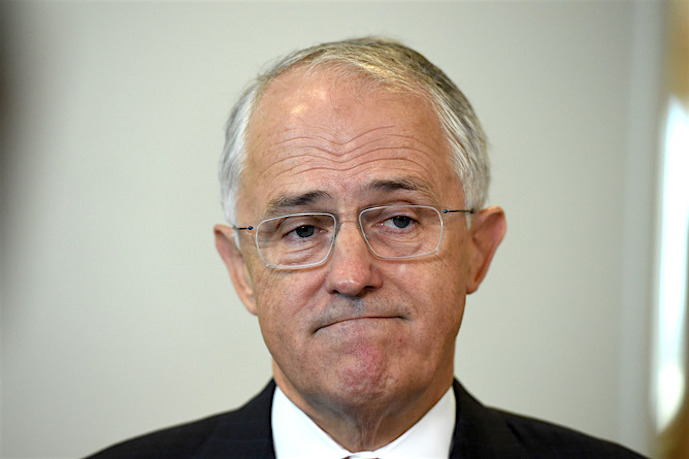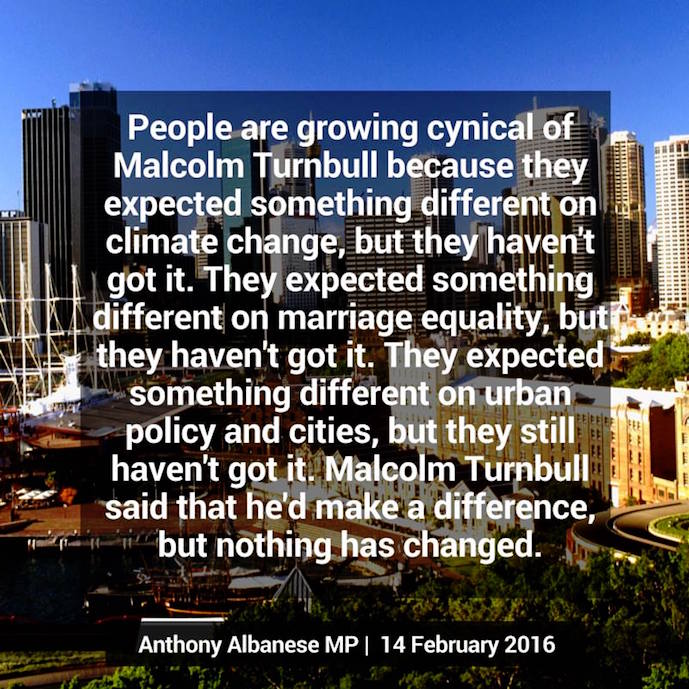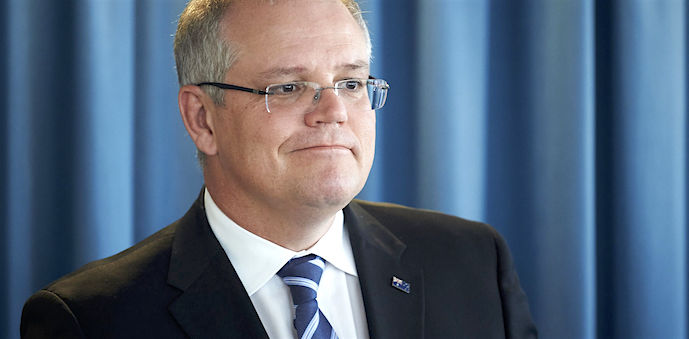
In the first of this short series, I described how after the disaster of Tony Abbott, the promise that Malcolm Turnbull brought to prime ministership was already fracturing as he fails, day after day, to live up to his own values, and reneges on his strongly held views. Abbott flagrantly and unashamedly broke his promises. With Turnbull it is subtler; he is saying and doing things that we all know are contrary to his position. This is perhaps most obvious with the issue of climate change, a matter that was covered exhaustively in the first in the series.
This the second, deals with Turnbull’s position on marriage equality, the Gonski reforms, the NBN, Australia becoming a Republic, his immigration policy, his cities policy, and his economic policy.
Marriage Equality. Everyone who has been listening to Turnbull knows that he is strongly in favour of marriage equality. He has said so many times in parliament and out. Moreover, he advocated a vote in parliament to determine the matter. But once he became PM he reverted to Abbott’s delaying tactic of a plebiscite
after the next election. Although he would regard the result as binding on the parliament, his old guard of conservatives, Eric Abetz, Cori Bernardi
et al vow to vote as they wish, irrespective of the views of the electorate. It seems as if this conservative clique is calling the shots, and Turnbull does not feel secure enough in his hold on leadership to stand up to them. What a disappointment from the one who challenged Abbott on the grounds of poor leadership!
The hope that Turnbull would reverse the Abbott tactic, and either have a vote in the parliament or at least hold the plebiscite at the time of the election, thereby saving an estimated 160 million dollars, has so far been dashed. If he is hoping to run either of these lines, he is leaving it pretty late,
Disappointingly, the promise of a Turnbull different from Abbott on this important social matter has been tarnished.
The Gonski school reform is another area where Turnbull’s promise is fading. He talks about the need for innovation, agility and entrepreneurship, but doesn’t add that these attributes are built on a foundation of sound education that starts in preschool and extends to university and beyond. And it must be available to
all who can benefit from it. The Gonski school reforms were designed to bring this about. After telling us all pre-election that he was on the same Gonski page as Labor, Abbott reneged post-election on the vital last two years of funding. Any hope that Turnbull would see the fallacy of curtailing spending on education was dashed after he and his education minister repeated the same weary line that ‘you can’t solve the schooling problem by throwing money at it’. Apart from being a stupid thing to say, suggestions about how the government would solve the problem, with or without money, were never forthcoming. So Gonski is in limbo.
The creation of a smart, innovative, agile nation will have to wait until Turnbull works out what to do about school education. His attitude to education accelerates disillusionment about him.
The NBN project has been a great disappointment for those who expected him to handle the NBN project with skill and flair. We all know he is a tech-head, a nerd when it comes to communications gadgets, the founder of OzEmail, one of our earliest email services. We remember that he was instructed by Abbott to ‘demolish the NBN’ which Labor had initiated, but hoped he would find a way of maintaining its initial design, which was to provide a super-fast broadband service to 97% of Australians with ‘fibre-to-the premises’ (FTTP) technology. He salvaged the NBN from Abbott’s onslaught by adopting a multi-technology approach, and substituting the inferior ‘fibre-to-the-node’ (FTTN) option, where fibre extends only to boxes on street corners, with Telstra’s old copper wire finishing the connection to the premises. In doing so, he lumbered this nation with a second rate facility just when we needed to be world leaders in an increasingly competitive global environment.
In a comprehensive assessment of the Coalition’s FTTN NBN in September 2105, Richard Chirgwin, telco analyst and journalist writing in
The Register, gave credit for some aspects of the government’s rollout, but was scathing about many, for example, in the critical areas of technology, the rollout timeline, speed, and the cost, He wrote:
The Liberal Party's pre-election policy document stated ”Our aim is that everyone in the nation should have access to broadband with download data rates of between 25 and 100 megabits per second by 2016”.
“That timeline was quickly exposed as optimistic and the "aim" unrealistic. The universal 25 Mbps service promise has now been pushed out to 2020.
“Fibre-to-the-node (FTTN), however, has to be regarded as the greatest disappointment of the policy: the government has failed to deliver either the rapid rollout or the amount of savings promised in the policy.
“Approximately 65 per cent of the FTTN portion of the rollout is expected to be completed by 2016-17. The remaining 35 per cent will be deployed in 2017-18 and 2018-19 and will in most cases be in areas served by HFC [Hybrid Fibre Co-Axial technology] networks”, the policy stated.
“At the most recent NBN presentation, the company hopes to activate 1.8 million premises on FTTN by 2018. That's a little late. Also, absent a full footprint plan detailing which premises will receive which technology, it's impossible to say if the promise of 65 per cent FTTN completion is on track.
“Verdict: Promises not kept.
Turnbull was scornful when he spoke of the cost of Labor’s NBN, which he deemed prohibitively wasteful. He ought now to be eating his words. Chirgwin had this to say:
”Cost: By far the worst performance is in the matter of the cost of the NBN.
“The pre-election assertion that [Labor’s] FTTP network would cost $90 billion was quickly revised down to $73 billion, which is still a lot of money, but at the same time, Turnbull's statements about the cost of his multi-technology model have repeatedly been revised upwards.
“The $20.4 billion capex [capital expenditure], and peak funding of $29.5 billion, were obsolete within a year, and after several revisions, the most recent estimates for the NBN build are peak funding of between $46 billion and $53 billion.
“The government protected its own books by the simple expedient of capping its investment. To meet the balance, NBN will have to raise its own debt.
“Verdict: The government has performed no better than its predecessor in making cost forecasts.”
You can read the sorry story in full
here.
The use of the image below to head Chirgwin’s piece tells the story.
 In summary, Turnbull’s demonized Labor’s FTTP NBN, and made wild promises about how much cheaper the Coalition’s FTTN NBN would be, and how much faster it would roll out to more homes. Once again he brought disillusionment to many – another Turnbull promise remains unmet.
Australia becoming a Republic
In summary, Turnbull’s demonized Labor’s FTTP NBN, and made wild promises about how much cheaper the Coalition’s FTTN NBN would be, and how much faster it would roll out to more homes. Once again he brought disillusionment to many – another Turnbull promise remains unmet.
Australia becoming a Republic has been a Turnbull dream for years. He was a member of the Australian Republican Movement since its formation in 1991 and later chairman. He headed the ARM team at the 1998 Australian Constitutional Convention, but John Howard’s manipulations thwarted his endeavours and the referendum in 1999 was lost, a stinging defeat that still lingers in Turnbull’s memory. Yet his advent to prime ministership kindled hopes that at last this nation might move away from being a constitutional monarchy to becoming a republic. Writing in
The Age, Tim Mayfield expressed this hope in
Australian republicans take hope from Malcolm Turnbull's ascent.
Expect yet another disappointment on this front. Perhaps understandably after his bitter 1999 defeat, he seems in no hurry to address the republic issue. He seems to be unwilling to spend any of his considerable personal political capital on this venture, especially in the face of resistance from his monarchist colleagues.
Political survival is more important to him than pursuing the cherished principle of Australia becoming a Republic.
Immigration policy has been dealt with here recently in
Australia’s diabolical dilemma. We are still waiting to see if Turnbull returns the 267 adults and 72 children now in Australia on ‘humanitarian’ grounds. NZ Prime Minister John Key has shown his compassionate face by offering to take them. Will Turnbull persist with the harsh Abbott policy, or show that he has a more benevolent attitude?
Cities policy was hailed as one of Turnbull’s most enlightened moves. Writing in the
Sydney Morning Herald in September of last year, in an article titled:
Turnbull government's cities portfolio: What does it mean and will it work?, Nicole Hasham reported the reaction of Committee for Sydney chief executive Tim Williams:
“…the decision to appoint a Minister for Cities is simply an idea "whose time has come". Hasham continued:
“Infrastructure chiefs across the nation have been buoyed by Prime Minister Malcolm Turnbull's enthusiasm for urban planning, including Jamie Briggs' appointment as the first Minister for Cities and the Built Environment and the government's new willingness to consider public transport investment."
That was then. What has happened since? We know what happened to Jamie Briggs, so how will his successor, rural MP Angus Taylor, fare? Turnbull has rejected suggestions he has
downgraded cities policy in his ministry reshuffle.
At the very least,we expect Turnbull to discard Abbott’s environmentally destructive pro-roads, anti-public transport attitude.
Anthony Albanese, who carries the splendid tag: ‘Shadow Minister for Infrastructure and Transport, Shadow Minister for Tourism, and Shadow Minister for Cities’, is sceptical about progress so far. Here’s what he said a few days ago about Turnbull’s disappointing performance so far:

This piece could go on and on cataloguing Turnbull’s disappointing performance, so let’s finish with his
economic policy.
Nobody disagrees with his view that this nation needed to be ‘agile’, ready to grasp the abundance of opportunities here and overseas. We all agree that in the wake of the downturn in mining the economy needs to reshape itself. The renewables industry was just one such opportunity for readjustment in our economy.
Underpinning these needed adjustments is the acute need for fiscal reform. Nobody questions the need for tax reform, industrial relations reform, or welfare reform. The Turnbull government’s progress on these fronts has been slow, erratic, minimal, and flawed. It could hardly have been much worse.
The GST was the first target. Labor made its position plain from the beginning. But the Coalition procrastinated, bumbling along insisting it was still ‘on the table’, until finally a few days ago its abandonment was announced by Turnbull, followed by his treasurer. Even after that, Minister for Employment, Michaelia Cash, was insisting the GST was still on the table! The disorganization and indecision was awful. No reasonable person would deny Turnbull and Morrison the right to have the effect of changing the GST modeled by Treasury, but with all the punch that Treasury has, why did it take so long for Turnbull and Co. to reach the same conclusion Labor reached months ago?
Reasonably, Turnbull rejected any change on the grounds that the net benefit would be too low, and the political cost too high. He has always emphasized that ‘fairness’ must characterize any change to the tax mix, but the lack of fairness inherent in this regressive tax was not his stated reason for rejection. Lack of fairness was Labor’s prime reason for rejection. It knew that increasing the level and scope of the GST would increase the already-high level of inequality in this country. Inequality does not feature in Turnbull’s arguments.
The removal or reduction of concessions that favour the wealthy in superannuation, negative gearing and capital gains tax has always been a fertile field for increasing revenue. But the top-end-of-town oriented Turnbull government has shied away from these obvious opportunities. Turnbull challenged Abbott on the grounds of his poor economic leadership; we are still waiting to see if Turnbull’s is any better.
Labor has outlined its policies, as have the Greens, but the Turnbull government flounders, adding indecision to uncertainty. I believe this is principally because of treasurer Morrison’s ideological obsession with reducing taxes. He sees removing concessions as tantamount to increasing taxes.

At his National Press Club address last week we saw the fiscal dithering of the Turnbull government writ large as Morrison waffled for 46 minutes telling what we already knew about the tough financial situation this country is in, that repairing it would be a long haul, taking on Test Match dimensions rather than those of a 20/20 Big Bash (no doubt he thought this was clever framing), and that any tax relief would be ‘modest’, and a long time coming. While using his copious words to berate Labor’s proposal, we did not hear one word from him about the Turnbull government’s policy on negative gearing, superannuation and capital gains, or for that matter on any other fiscal policy. The speech was vacuous and insulting to the NPC audience that gathered expecting to get at a least a morsel of information on these crucial matters.
Morrison was attacked repeatedly the next day on talk back radio over his arrogant disrespect for those seeking information about important government policy, but fobbed off his assailants with his usual torrent of words unstoppably tumbling from his loquacious mouth. Bernard Keane of
Crikey in his brilliant piece:
Waiting for ScoMo - in which no policy happens, twice, aptly described Morrison’s NPC speech as
“…more a one-hander version of Waiting for Godot, the play in which, famously, nothing happens, twice.
But at least in his post-address talkback appearances he did introduce us to the ‘unicorn’ frame. Morrison is not much better at picking apt metaphors than he is at picking apt fiscal policies. Let me take you down a side road for a bit.
We all know what this mythical creature looks like, but why did Morrison use the unicorn as a metaphorical frame?
I looked through Renton’s Metaphors but found no reference to the unicorn. Wikipedia did not help either. In fact it said: “In the Middle Ages and Renaissance, it was commonly described as an extremely wild woodland creature, a symbol of purity and grace, which could only be captured by a virgin…its horn was said to have the power to render poisoned water potable and to heal sickness.” Not what Morrison intended!
Another source asserts that chasing unicorns is looking for the right job. Surely not what Morrison was thinking!
In the Hebrew Bible it was often used as a metaphor representing strength…a wild, un-tamable animal of great strength and agility. Agility is what Malcolm desires; perhaps Scott does too!
I suspect though that his metaphorical meaning is that ‘chasing unicorns’ is the pursuit of something that, for all intents and purposes, is unobtainable, as unicorns don't exist.
He might have been wiser to tone down his rhetoric by choosing a more understandable metaphorical frame – perhaps ‘chasing rainbows’ would have resonated better.
That’s enough about the cascade of disappointments that have come flooding from our new PM, his treasurer and much of his ministry. To many, Malcolm is a likeable fellow. Well-educated, well-spoken, dignified, prime ministerly, he held out such promise to an electorate tired of the combative, aggressive Abbott. Turnbull heralded a new era for voters tired of the embarrassment of having Abbott as our leader, relieved that at last we had one who could make us feel secure, if not proud.
Then the disillusionment began. Day after day, as the Coalition vacuum cleaner sucked up policy opportunity after policy opportunity into the dust receptacle of abandoned prospects, disappointment grew.
Disappointment is contagious. Initial goodwill towards Turnbull is fading day after day as he and his government dither, ply us with platitudes, make faraway promises, dishonours them, does nothing, goes nowhere, marches on the spot, yet talks as if they have grand plans, sadly for a distant and receding future. Reflect on what Morrison said in his NPC address and you will see what I mean.
Some Labor supporters might want to see the Turnbull government fail, but even those must be demoralized by the reality that the awful Abbott government that did so much damage has been replaced by a torpid do-nothing outfit that seems lost in the political wilderness without a compass.
The Magic Malcolm that so many welcomed seems to have gone up in a Puff of Liberal Blue smoke.

What do you think?
This second pieces concludes this short series on Turnbull’s shortcomings and his backsliding as he fidgets under the repressive thumb of the reactionaries in his own party. If he cannot cast off the conservative curse, clamber out from under the repressive influence of the Abbott-led opponents, he may never show us the Real Malcolm Turnbull, whose values and genuine beliefs have made him so popular with the voters.
Will he be crushed into humiliating submission, crippled by forced conformity, curtailed in every move his better self tells him to make, incarcerated by those who gave him power? Even Laborites hope not. We know the Malcolm of old; we were hoping for something better this time around. But so far we have experienced only disappointment and disillusionment.
Do tell us what you think in the comments section.
Current rating: 0.4 / 5 | Rated 13 times